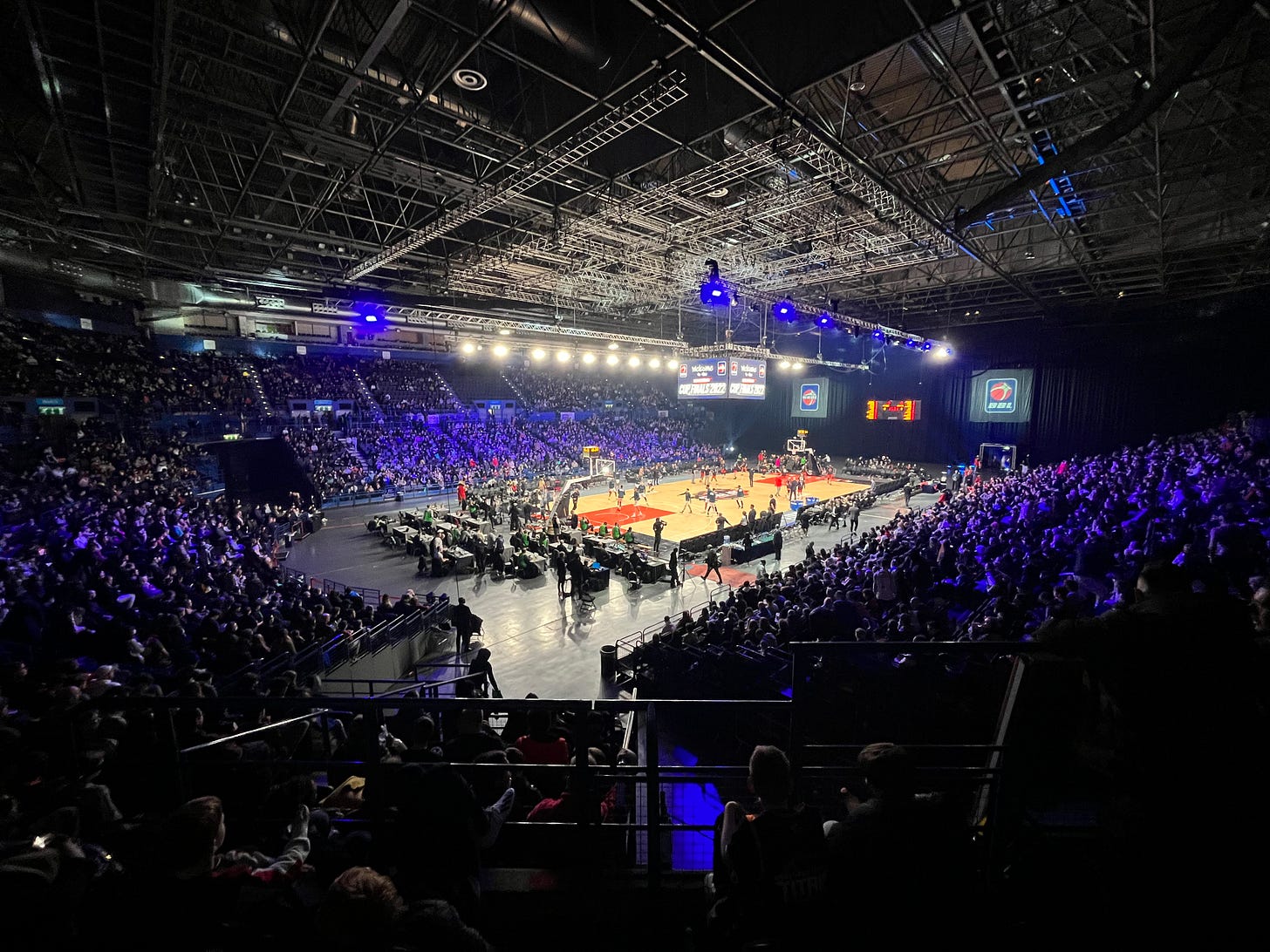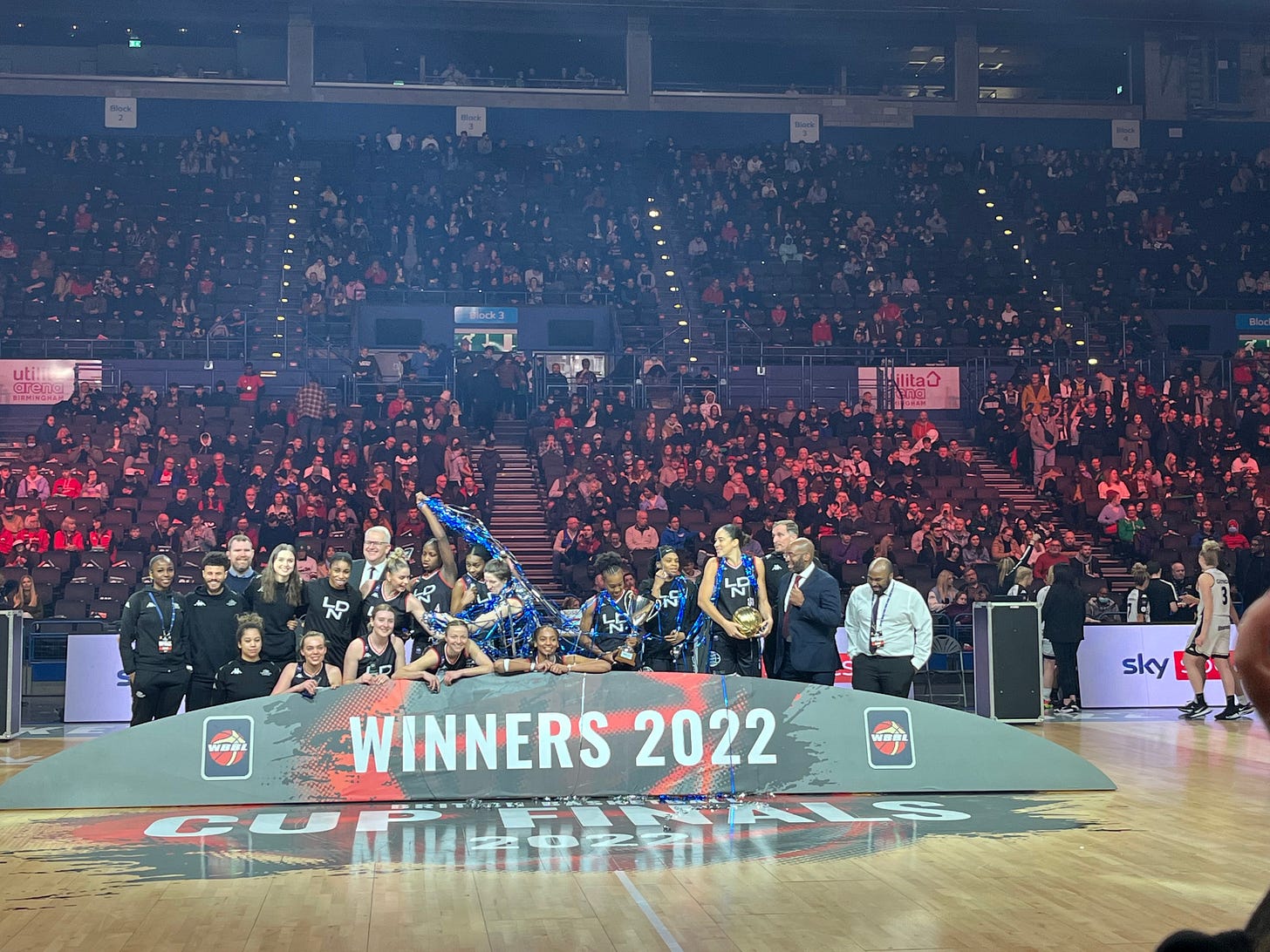New teams, commerciality and Chipotle
What 777 Partners investment means for the men’s British Basketball League
“There’s around 450 NBA players, and the top 150 are amazing, but the other few hundred or so are indistinguishable from the next 1,000.”
This is Lenz Balan of 777 Partners, which owns the London Lions and, as of 20 December 2021, 45 per cent of the men’s British Basketball League. And his ambition is for the BBL to be the destination for those next few hundred players that compete for a spot at the end of the bench in the men’s NBA.
“We think that the UK – partly because of its close relationship with the US, partly because you’ve got Chipotle, partly because you’ve got a Western government with functioning laws – should be a very attractive place for top American players to come and play.”
777 has grand ambitions for the BBL, and Balan is singing off a hymn sheet that is pretty similar to the one British basketball fans have been holding for a long time: that this English-speaking country that’s not far away from the USA has a passionate, albeit fledgling, fanbase, and that basketball here would benefit from an injection of cash and some strong leadership.
It should be attractive to some of the best second-tier basketball players in the world. At present, Europe and China attract the lion’s share of those men and women, but 777 believes in the potential of the BBL.
Balan said: “We get excited when we feel there are greenfield opportunities and sleeping giants; when we can look at other examples of other people who have done something similar. When you look at the story of British basketball – it grew in the 1990s, then declined – you compare it to what happened in the German Bundesliga and the Australian NBL and how they’ve turned that around – you say, ‘this can happen’.
“We don’t have to do anything special to make it work. It was a sleeping giant and we saw examples in the marketplace of people who have been able to make basketball a top sport, even though it wasn’t a favourite sport in their own countries and was far behind others. I think all of that gave us confidence around the investment.”
The private firm invested £7 million into the BBL. The number is exciting – and arguably values the league at around £15m in total, with franchises worth somewhere between £1-3m each depending on market and location – but it is dwarfed by another recent cash injection for a basketball league: the WNBA was the recipient of $75m in January.
Still, the WNBA is arguably the top women’s basketball league in the world, and for a British audience, £7m is no joke.
Watch The Hoops Nerd’s exclusive interview with Lenz Balan
For one American, the reigning BBL MVP, he hopes the new capital will offer one thing. Geno Crandall joked: “If there’s a bunch of money coming in I’d like to see some of it in my pocket.”
The league has been lucky to have a talent like Crandall playing for the Leicester Riders the past two seasons. His flashy passes and clutch buckets make the team one of the most fun to watch, and they have already picked up silverware this year with him at the helm.
The BBL has a handful of players like Crandall that come through every few years – someone who is earning a large percentage of the team’s outgoings but could probably earn more in Europe.
He said: “There’s a lot of basketball fans in the country that I’ve seen in my year and a half here, but it’s important to get people to take pride in British basketball, take pride in the league, and take pride in the GB team when they’re playing. There’s GB guys in our league, so if you can build those fanbases around them, I think the league is moving in the right direction.”
Some BBL teams have been ambitious when it comes to attracting talent. You can see why former London Lions coach and owner Vince Macaulay managed to attract the initial investment from 777 – the firm acquired the franchise in 2020 – when you look at their recent rosters. They have had GB players, top European prospects and even NBA-calibre players on their roster in recent years, such as Justin Robinson and Ovie Soko, as well as a former teammate of LeBron James, DeAndre Liggins.
With the league hoping to attract these names more often across all teams, there have been discussions around the concept of a player’s union to help with bargaining over such things like salary and welfare. On a British basketball Twitter Spaces discussion after the investment, former Lions captain Joseph Ikhinmwin called upon current players to unite.
Balan doesn’t have anything against unions personally but was unsure about 777’s feelings on the matter at large. He reiterated the importance of building a commercial enterprise first.
He said: “We want the players to do well. Fundamentally for the players to do well, we’re going to need to do a lot in terms of raising the commerciality of the league, and that’s going to take some time, and it’s going to need leadership at the central level. It’s going to take content to drive a growth plan to make sure that we can bring the best players and create home grown, high quality talent and build on the history of British basketball players.
“But to make sure that they can get compensated, the only way the league is going to grow sustainably and players wages are going to be increased is if we can build the BBL. What the players want to do is up to them, our plan is to grow the league at all costs.”
To successfully build the BBL, the league will need to turn a traditionally non-basketballing nation into an island of super fans. This will take more than just bucketloads of cash, especially for Manchester Giants point guard Jack Hudson.
He said: “We need to start at the foundation level and build proper programmes that aren’t going to fall away after a couple of years. I think that’s massive. I come from Liverpool and there was a BBL team there for a few years but there was no foundation in place and it fell away. That’s the most important thing for me – more in the community and work your way up.”
The press release that announced the investment in December said that the £7m will be used to deliver an ambitious plan “from community grassroots through to the overall infrastructure of the elite game in the UK”. Quite the task.
To do this, Balan spoke a lot about refocusing the mission of the league to become an entertainment product, and the need for return on investment is clear. But there is talk of patience.
He said: “We’re not short term folks. We don’t sell businesses. From our perspective we’re always going to make what we think is the long term best choice. And the long term best choice is to maintain the integrity of the league.”
The management structure will change. New jobs have already been advertised at BBL HQ, and the league is partnering with Creative Artists Agency (CAA), one of the best agencies in the world, to help search for a new CEO. But that role will place entertainment and content at the front of its job description, not community building, and they don’t even need to necessarily be a “basketball person”, according to Balan.
There will be a focus on growth, which includes four new teams, and we’ve already seen City of Birmingham Rockets and Reading Rockets put together ownership groups and make official statements of intent. Before Reading threw their hat in the ring, Balan said: “Birmingham is obviously a very important market for us. It’s important to have strong teams in major cities, in part because that’s where the populations are, and it’s also where the diverse populations and basketball fans really are.”
Balan didn’t announce any changes to the franchise fee required for teams to join the league – which Mark Woods previously reported as having ambitions of reaching £1m per club to join – but he confirmed that the BBL is looking at what the figure should be.
Balan said: “What we’re really concerned about is bringing in the right owners who are sustainable and interested in growing for the long term. For a lot of the previous owners that flamed out, they had this issue of the BBL not being where the league needed to be in order to be successful. Our pitch to potential investors and owners is that our investment should represent a sea change in the league, and they should feel comfortable in going on this journey with us. Being in big cities is important but wherever there is a passion for basketball, wherever there are fans, we want a franchise.”
More teams would mean more open roster spots, and that could mean more opportunities to pry away some of those few hundred players that rotate on the end of the NBA benches. It can only mean good things for the league, and while 777 is not looking to make a quick buck, it doesn’t seem concerned with bruising a few egos and breaking a few eggs to make the right decision for the future of the BBL.
What does it mean for the women’s game?
Ultimately, not much right now. 777 Partners invested in the men’s BBL. There is a commercial arrangement between the men’s league and the women’s league, which the new CEO will have to oversee.
The press release announcing the investment said additional resource will be channeled towards the league and that there will be some involvement within the national governing bodies and the national teams.
Balan didn’t expand on this, but he said: “The WBBL has a commercial arrangement with the men’s league, so part of the CEO’s remit is to package those things and grow the women’s game as well. The deal was not with the WBBL it was with the men’s BBL. We have a very close commercial relationship, in which the men’s BBL supports the WBBL. I can say that the Lions are huge supporters of women’s basketball, and we’re incredibly excited and proud of our women and where they’ve reached in European competition. We’ve invested a lot in the team and learned a lot that we can get better, and that’s true for everything we’re doing, but we absolutely want to grow the women’s game along with the men’s game, as shown in our investment of the women’s club. Our CEO and management team have the remit to do everything they can to grow the commerciality of the women’s game.”
The London Lions women’s team has experience in dealing with 777, and head coach Mark Clark said: “The way the game looked at the Cup Finals, the way the WBBL looked and was presented, I think the important thing is to build on what the league already does well. The WBBL already does a great job of staging events, selling tickets and getting people to come watch basketball. You add what 777 brings, and you get a whole new level of professionalism and production on the game. The game looked a different level, and I’m sure the men’s game will be the same. The mistakes that British basketball has made is they’ve thrown out what was there before and the new people would say ‘we know, and you don’t’.
“They are trying to build on what is there, they’re trying to stretch the BBL and WBBL and I think you saw the result in the way the promotion worked at the Cup Finals.”





